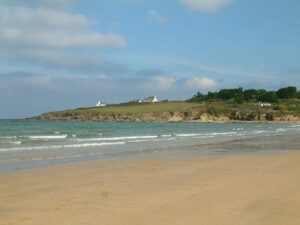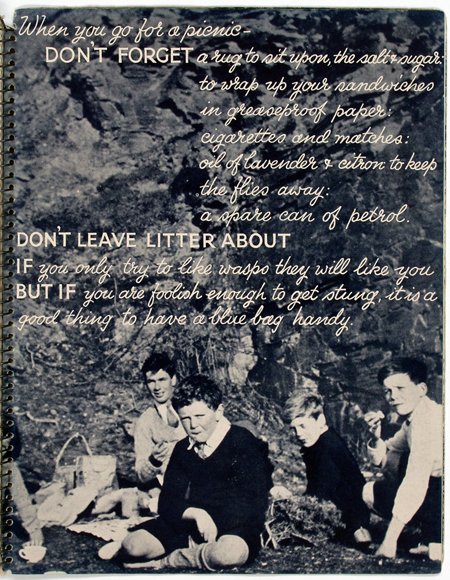Betjeman’s picnics are filled with the nostalgia of his youth. The earliest appears in Cornwall (1934), a series of The Shell County Guides that he and John Beddington conceptualized. A photograph of boys at a picnic (perhaps Betjeman among them ) shows the group seated on the grass beside what Betjeman calls a “rug.”
“When You Go on a Picnic” shows a sense of humor and familiarity with picnicking. However, when you read the text and look at the photograph, you realize they don‘t connect. The picnic advice is practical, but remembering to pack cigarettes, matches, and a “spare can of petrol” is not for the young boys in the picture. The “lavender and citron to keep the flies away” presages his poem “Trebetherick” (1940).
“Trebetherick,” named after a town in Cornwall, plays to the memory of any picnicker who remembers (actual or imagined) that if you picnic, there will be wasps in the tea or sand in the sandwiches. The opening sets the scene on an Atlantic beach that any picnicker thinks they, too, remember:
We used to picnic where the thrift
Grew deep and tufted to the edge;
We saw the yellow foam-flakes drift
In trembling sponges on the ledge
Below us, till the wind would lift
Them up the cliff and o’er the hedge.
Sand in the sandwiches, wasps in the tea,
Sun on our bathing-dresses heavy with the wet,
Squelch of the bladder-wrack waiting sea,
Fleas round the tamarisk, an early cigarette

John Betjemin. Daymer Beach, Trebetherick
Betjeman intends more, and in context, you realize that “Trebetherick” suggests the stress of being an adult at the start of World War Two in 1940 when the Nazis severely threatened England. The picnic looks back at an earlier time, on holiday, when Betjeman picnicked on the beach with his parents. “Sand in the sandwiches” and “wasps in the tea” were not impediments to having a grand time in a paradise of sorts, conjuring up the time when England was not at war–when youth offered solace.
At war’s end, “The Archeological Picnic” (1945) suggests the poet’s re-discovery of what was lost during the preceding years. Again, Betjeman alludes to a first love, perhaps with his wife, Penelope (maybe not):
So stand you waiting, freckled innocence!
For me the squinch and squint and Trans arcade;
For you, where meadow grass is evidence,
With flattened pattern, of our picnic made,
One bottle more of fizzy lemonade.
Three years later, in 1948, Betjeman, at 44, was unhappily married. Now, with happiness and youth in the distance, in “Beside the Seaside” (1948), he’s projecting life to come and thinking that even if England survives the war, the world will be so changed that there will be only the beach, the waves, and the sea. If a picnicker still exists, he might stare at some “starfish in a jeweled basin of a pool.” The poem ends with no one “left to picnic on the blazing rocks” of a lonely beach. If ever there is a bleak picnic, it’s at the end of the world (as Betjeman knew it then).
As Betjeman’s spirits recovered, so did his romantic (adulterous) love life. His last picnic in Summoned by Bells: An Autobiography in Verse (1960) is notable for the image of his youth:
The picnic and the orchid hunt,
On Oxey mead, the rounders played,
The belly-floppers from the punt,
The echoes that our shouting made:
The rowing back, relaxed and slack,
The shipping oars in Godstow. . .
Of course, Godstow is a real place in Betjeman’s life, but it alludes to Lewis Carroll, who rowed there pleasurably with Alice Liddell while creating Alice’s Adventures Wonderland.
Featured Image: John Betjeman. “When You Go on a Picnic,” Cornwall. London: Architectural Press, 1934; http://www.creativereview.co.uk/cr-blog/2008/february/the-shell-guides-a-very-british-surrealism
See John Betjeman. Cornwall Illustrated in a Series of Views, of Castles, Seats of the Nobility, Mines, Picturesque Scenery, Towns, Public Buildings, Churches, Antiquities, &C. London: The Architectural Press, 1934; “Trebetherick,” Old Lights for New Chancels (London:1940); “The Archeological Picnic” (1945), from New Bats from Old Belfries (London: John Murray, 1945); “Beside the Seaside,” Selected Poems (London: John Murray, 1948); Summoned by Bells: An Autobiography in Verse (London: John Murray, 1960)

